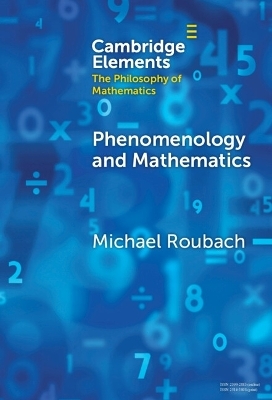
Phenomenology and Mathematics
Seiten
2023
Cambridge University Press (Verlag)
978-1-009-46250-1 (ISBN)
Cambridge University Press (Verlag)
978-1-009-46250-1 (ISBN)
This Element examines the phenomenological conceptions of natural number, the continuum, geometry, formal systems, and the applicability of mathematics. Its focus is the mathematical thought of Edmund Husserl and other phenomenologists including Weyl, Gödel, and Rota.
This Element explores the relationship between phenomenology and mathematics. Its focus is the mathematical thought of Edmund Husserl, founder of phenomenology, but other phenomenologists and phenomenologically-oriented mathematicians, including Weyl, Becker, Gödel, and Rota, are also discussed. After outlining the basic notions of Husserl's phenomenology, the author traces Husserl's journey from his early mathematical studies. Phenomenology's core concepts, such as intention and intuition, each contributed to the emergence of a phenomenological approach to mathematics. This Element examines the phenomenological conceptions of natural number, the continuum, geometry, formal systems, and the applicability of mathematics. It also situates the phenomenological approach in relation to other schools in the philosophy of mathematics-logicism, formalism, intuitionism, Platonism, the French epistemological school, and the philosophy of mathematical practice.
This Element explores the relationship between phenomenology and mathematics. Its focus is the mathematical thought of Edmund Husserl, founder of phenomenology, but other phenomenologists and phenomenologically-oriented mathematicians, including Weyl, Becker, Gödel, and Rota, are also discussed. After outlining the basic notions of Husserl's phenomenology, the author traces Husserl's journey from his early mathematical studies. Phenomenology's core concepts, such as intention and intuition, each contributed to the emergence of a phenomenological approach to mathematics. This Element examines the phenomenological conceptions of natural number, the continuum, geometry, formal systems, and the applicability of mathematics. It also situates the phenomenological approach in relation to other schools in the philosophy of mathematics-logicism, formalism, intuitionism, Platonism, the French epistemological school, and the philosophy of mathematical practice.
1. Basic concepts of Husserl's phenomenology; 2. Husserl's path from mathematics to phenomenology; 3. Phenomenology of mathematics; 4. Phenomenology and philosophies of mathematics; References.
| Erscheinungsdatum | 02.11.2023 |
|---|---|
| Reihe/Serie | Elements in the Philosophy of Mathematics |
| Zusatzinfo | Worked examples or Exercises |
| Verlagsort | Cambridge |
| Sprache | englisch |
| Themenwelt | Geisteswissenschaften ► Philosophie ► Erkenntnistheorie / Wissenschaftstheorie |
| Geisteswissenschaften ► Philosophie ► Philosophie der Neuzeit | |
| Mathematik / Informatik ► Mathematik | |
| Naturwissenschaften | |
| ISBN-10 | 1-009-46250-4 / 1009462504 |
| ISBN-13 | 978-1-009-46250-1 / 9781009462501 |
| Zustand | Neuware |
| Haben Sie eine Frage zum Produkt? |
Mehr entdecken
aus dem Bereich
aus dem Bereich
die Grundlegung der modernen Philosophie
Buch | Softcover (2023)
C.H.Beck (Verlag)
CHF 25,20
Buch | Softcover (2023)
Reclam, Philipp (Verlag)
CHF 9,80


![Was heißt Denken?. Vorlesung Wintersemester 1951/52. [Was bedeutet das alles?] - Martin Heidegger](/media/113619842)